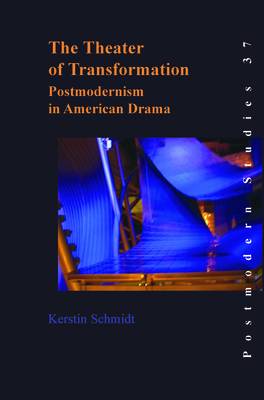
- Afhalen na 1 uur in een winkel met voorraad
- Gratis thuislevering in België vanaf € 30
- Ruim aanbod met 7 miljoen producten
- Afhalen na 1 uur in een winkel met voorraad
- Gratis thuislevering in België vanaf € 30
- Ruim aanbod met 7 miljoen producten
Zoeken
Omschrijving
The Theater of Transformation: Postmodernism in American Drama offers a fresh and innovative reading of the contemporary experimental American theater scene and navigates through the contested and contentious relationship between postmodernism and contemporary drama. This book addresses gender and class as well as racial issues in the context of a theoretical discussion of dramatic texts, textuality, and performance. Transformation is contemporary drama's answer to the questions of postmodernism and a major technique in the development of a postmodern language for the stage. In order to demonstrate the multi-faceted nature of the postmodern theater of transformation, this study draws on a wide range of plays: from early experimental plays of the 1960s by Jean-Claude van Itallie through feminist plays by Megan Terry and Rochelle Owens to more recent drama by the African-American playwright Suzan-Lori Parks.
The Theater of Transformation: Postmodernism in American Drama is written for anyone interested in contemporary American drama and theater as well as in postmodernism and contemporary literary theory. It appeals even more broadly to a readership intrigued by the ubiquitous aspects of popular culture, by feminism and ethnicity, and by issues pertaining to the so-called 'society of spectacle' and the study of contemporary media.
The Theater of Transformation: Postmodernism in American Drama is written for anyone interested in contemporary American drama and theater as well as in postmodernism and contemporary literary theory. It appeals even more broadly to a readership intrigued by the ubiquitous aspects of popular culture, by feminism and ethnicity, and by issues pertaining to the so-called 'society of spectacle' and the study of contemporary media.
Specificaties
Betrokkenen
- Auteur(s):
- Uitgeverij:
Inhoud
- Aantal bladzijden:
- 232
- Taal:
- Engels
- Reeks:
- Reeksnummer:
- nr. 37
Eigenschappen
- Productcode (EAN):
- 9789042018952
- Verschijningsdatum:
- 1/01/2005
- Uitvoering:
- Paperback
- Formaat:
- Trade paperback (VS)
- Afmetingen:
- 155 mm x 235 mm
- Gewicht:
- 371 g

Alleen bij Standaard Boekhandel
+ 247 punten op je klantenkaart van Standaard Boekhandel
Beoordelingen
We publiceren alleen reviews die voldoen aan de voorwaarden voor reviews. Bekijk onze voorwaarden voor reviews.








